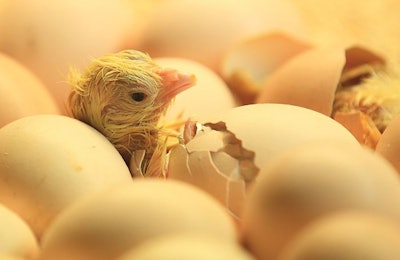
Gene-edited hens that lay eggs that only produce female chicks could help solve the male chick layer dilemma in the layer industry.
“This technology was designed from the very beginning to fit into the industry,” said Yuval Cinnamon, a principal investigator at the Agricultural Research Organization, The Volcani Center, NRS Poultry Sustainability and Transformation. “When I asked the industry what the most critical problem was, everyone pointed toward male layer chicks.”
Approximately 6-7 billion male layer chicks are culled each year, a major animal welfare and economic concern for the layer industry. Producers spend more than $70 million in labor and energy to incubate and sex these eggs and the value of wasted eggs in the U.S. is more than $440 million annually.
How the gene-editing technology works
The gene editing technology, now licensed by Huminn Poultry, regulates the activation of the Z chromosome by an optogenetic system that uses a blue light that shines through the eggshell at the incubator, Cinnamon explained during the 2021 Poultry Tech Summit Webinar series.
In poultry and other birds, males have two Z chromosomes, while females have a ZW chromosome. The genetic change affects only the female parental Z chromosome.
This means that while the male eggs cease development at early embryogenesis, the genomes of female chicks are not affected.
The first of the gene-edited parent female chicks, called “Golda,” hatched in 2021. These hens have now reached maturity and began laying eggs. In preliminary tests, only the female chicks hatched, and the male embryos stopped developing, Cinnamon said.
“We’ve already had some good indications that the system works, but now we were able to test the system,” he explained, noting that previous research had been conducted in tissue culture.
The gene edited hens and resulting eggs can be sold in the EU without any regulatory change. The technology is currently under review by the U.S. Food and Drug Administration (FDA) and Israel’s Agriculture Ministry.
Cinnamon and his team, led by Dr. Enbal Ben-Tal Cohen, is currently looking for commercial partners to test and further refine the technology.
Once commercialized, the Golda hens will be kept at poultry breeding centers, while their offspring will be available to the layer industry for egg production.
Attend the 2023 Poultry Tech Summit
Join an exclusive international gathering of industry-changing innovators, researchers, entrepreneurs, technology experts, investors and leading poultry producers at the 2023 edition of Poultry Tech Summit on November 6-8 at the Hilton Atlanta Airport in Atlanta, Georgia.
Attendees can expect the same groundbreaking innovation and insightful presentations that made the previous events well-attended with deep dialogue on new prospective solutions and next-generation technologies. Poultry Tech Summit focuses on the transition of innovative technologies into commercial applications to advance the poultry industry.
Registration for this event will open in the spring of 2023.


















